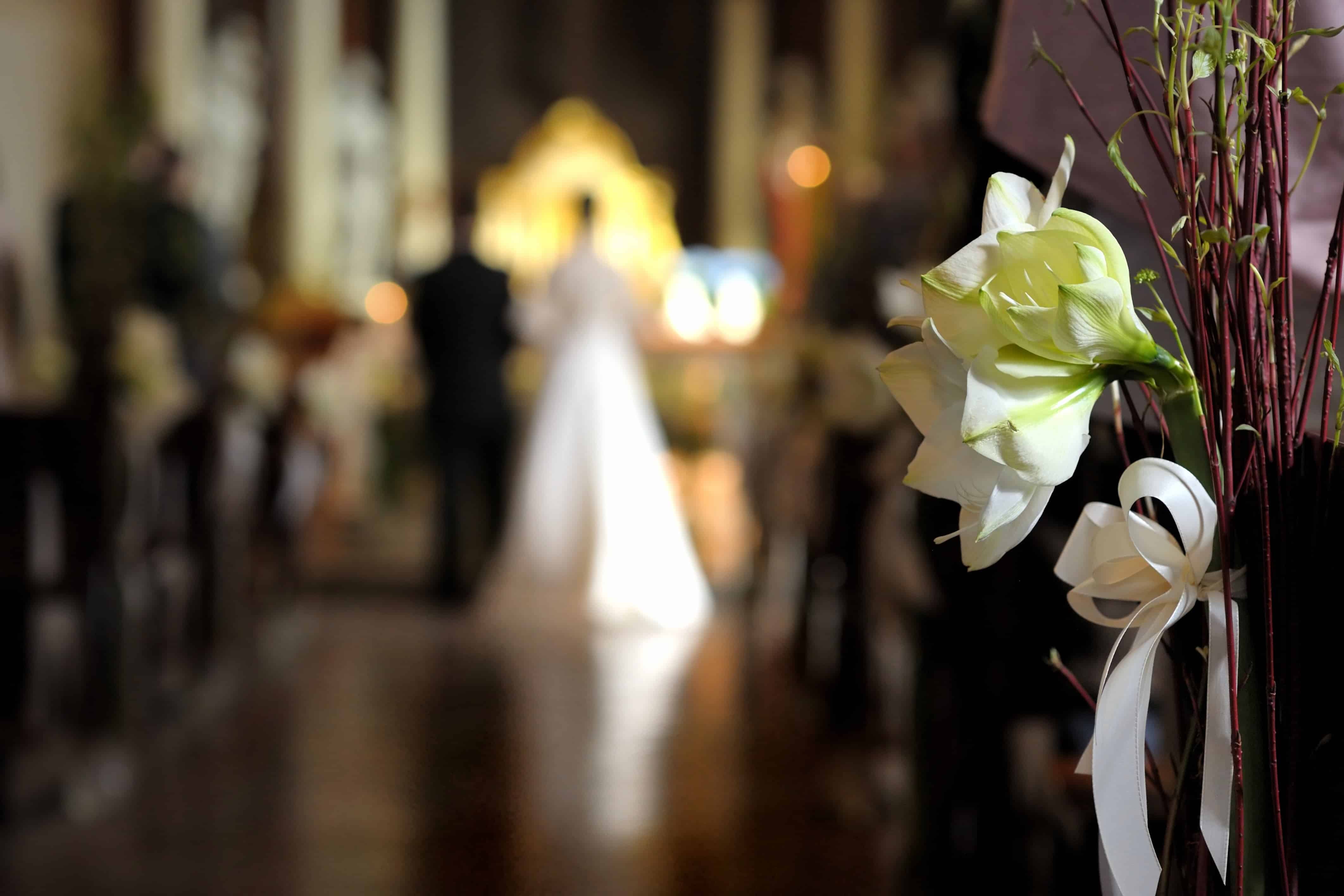For more information on how to get married at St. Catherine’s Church, please click here or contact one of the parish priests at (904) 264-0577.
“In virtue of the sacrament of marriage, married Christians signify and share in the mystery of the unity and fruitful love that exists between Christ and his Church; they thus help each other to attain holiness in their married life and in welcoming and rearing children; and they have their own special place and gift among the people of God.”
(Rite of Marriage, 1)
“The matrimonial covenant by which a man and a woman establish between themselves a partnership of the whole life and which is ordered by its nature to the good of the spouses and the procreation and education of offspring has been raised by Christ to the dignity of a sacrament between the baptized”
(Code of Canon Law, 1055.1)
From these definitions, we discover the essential properties necessary for marriage and the essential elements of marriage embedded in the nature of the institution itself.
Essential Properties of Marriage
“The essential properties of marriage are unity and indissolubility, which in Christian marriage obtain a special firmness by reason of the sacrament.”
(Code of Canon Law, 1056)
- Unity (consortium) implies exclusivity and fidelity (bonum fideli)
- Whole of life (indissolubility) implies permanence (bonum sacramenti)
These properties are not goals external to marriage but qualities inherent in the institution of marriage itself. These properties are considered part of natural law and are independent of the will or intention of the partners.
Essential Elements of Marriage
The essential elements of marriage (ends or purposes) are:
- The good of the spouses (bonum coniugum), which consists in the growth and maturing of the spouses as persons, through the aids, comforts, and consolations, but also the demands of hardships, of conjugal life, when lived according to God’s plan.
- The good of the offspring (bonum prolis), which consists of the procreation, nurturing, and education of children that includes the physical, social, cultural, moral, and religious upbringing.
Authored by God
“The intimate partnership of married life and love has been established by the Creator and qualified by His laws and is rooted in the conjugal covenant of irrevocable personal consent. For, God Himself is the author of matrimony, endowed as it is with various benefits and purposes” (Gaudium et Spes, 48.1).
God requires certain conditions to be present between a man and a woman in order to establish a valid marriage between them.
Marriage is brought about through:
- Valid consent: The consent of the bride and groom is “an act of the will by which a man and a woman mutually give and accept each other through an irrevocable covenant to establish marriage” (Code of Canon Law, 1057.2; cf. Code of Canon Law, 1095-1104). To see a list of ways in which consent is considered invalid or incomplete, please click here.
- Lack of Impediment: There are no conditions that disqualify individuals from any marriage or a particular marriage (cf. Code of Canon Law, 1083-1094). To see a list of impediments to marriage, please click here.
- Proper Form: For Roman Catholics, the canonical form must be observed. Eastern Catholics must follow the prescribed sacred rite. Non-Catholics are always bound to manifest their consent according to some public form and to observe the law of their church or ecclesial community and are bound by the form prescribed by civil law (cf. Code of Canon Law, 1108-1123).
Biblical Foundations of Marriage
The Church’s approach to marriage has always been anchored in Biblical foundations.
- Jesus condemns divorce as a distortion of the Creator’s original intention for marriage and a concession to the human hardness of heart (Mt. 19:3-12).
- St. Paul responds to the Corinthian community and teaches them about marriage and divorce (1 Cor. 7:1-16).
- St. Paul also reflects in his letter to the Ephesians on the analogy between the relationship of husband and wife and that between Christ and the Church (Eph. 5:22-33).
Brief History of Christian Marriage
- St. Augustine argued that the good of permanence (sacramentalitatis) distinguished Christian marriage from those of other people and because of its essential goodness, marriage was a sacred reality that imparted a permanent character and indissoluble bond similar to baptism.
- In 1184, at the Council of Verona, marriage was first included among the seven sacraments, seen as equivalent to baptism and eucharist, and having the ability to convey grace (even though earlier theologians of marriage as a “sacrament.”
- In response to the Protestant reformers who denied the sacramentality of marriage, the Council of Trent defined marriage “as truly and properly one of the seven sacraments of the evangelical law, instituted by Christ the Lord” (Trent, sess. XXIV).
- Vatican II gave a prominent place to the importance of Christian marriage in the Pastoral Constitution Gaudium et Spes. This document on the Church in the Modern World changed the notion of marriage as a contract to marriage as a covenant, which is more biblical and more personal. Gaudium et Spes redefined the idea of marital consent as a mutual bestowal and acceptance of each other while reiterating the sacred bond of marriage as indissoluble. This constitution shapes the 1983 Code of Canon Law, which is the current and effective law of the Church concerning marriage.

